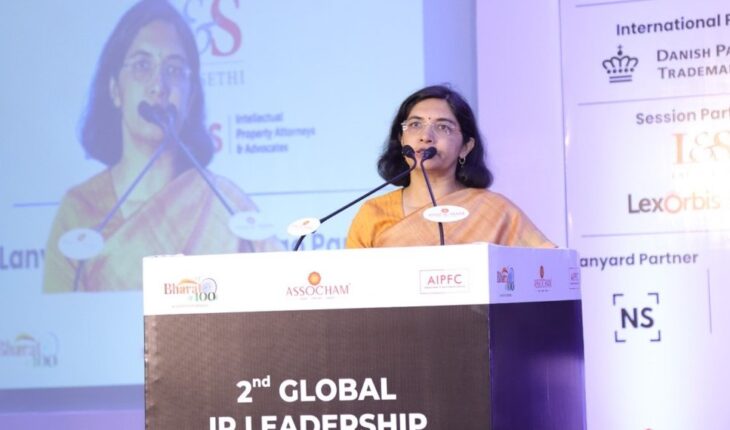We must look at the social impact along with economic says Himani Pande– Additional Secretary, GOI
New Delhi: “Viksit Bharat 2047 is about empowering people, a thriving economy, a prosperous India and a sustainable India. IP addresses all components of Viksit Bharat and Atmanirbhar Bharat. However, technology does not address every problem that we face today. We have to also think of the social impact our work has and not just focus on the economics, said Himani Pande Additional Secretary – Department for Promotion of Industry and Internal Trade, Ministry of Commerce and Industry, Govt. of India at ASSOCHAM’s 2nd IP Leadership Summit and Awards.
The introduction of biometrics in the PDS system has reduced pilferage through ghost beneficiaries and made ration accessible across the country. It does not however solve all problems making it important to build in civic attention into innovations and IP. Just two percent of IP Grants are commercialised, and we are in the process of framing the IP financing framework to increase that number not just for the economics but also for the societal benefits.” said Himani Pande Additional Secretary, DPIIT, Ministry of Commerce and Industry, Govt. of India.
Prof. (Dr) Unnat P. Pandit Controller General of Patents, Designs & Trademarks (CGPDTM), Govt. of India, said “IP and innovation plays a crucial role in driving development and we are working to ensure that we offer IP driven solutions that are developed, deployed and commercially utilized. The country needs to strengthen its IP position. Year on year we are witnessing a growth in in IP filings. In FY 2023-2024, we have 90,300 patent filing which highlights the confidence of researchers in the Indian economy. There is enough traction on not just development of a science or technology but equally on protection.”
Pravin Anand, Chairperson ASSOCHAM IPR Council and Managing Partner, Anand and Anand, said, “IP balances the old and the new, and values science as well as arts. Traditional knowledge has now been incorporated in the world of IP. Geographical indications and well known trademarks relies upon long usage and base their strength on what is old. There have been tremendous changes in the intellectual property in the past years. The need of the hour is to join hands in strengthening the IP law.”
Setting the context at the summit, Dr. Hemang Shah, Co-Chairperson ASSOCHAM IPR Council, India Engineering Lead, Qualcomm said, “We are witnessing a major rise of IP contributors in the country, large companies, domestic filers, start-ups, research and educational institutions. Looking at all the metrics, we have the right building blocks for a Viksit Bharat by 2047. But to achieve that we have to make meaningful progress in terms of innovation and execution.”
Speaking at the summit, Dr. Louise Boisen, Counsellor – IPR, Danish Patent and Trademark Office said, “No country can solve every problem humanity is facing on its own. Technologies and solutions need to be transferred for greater impact. For the transfer to be a success, developers and inventors need to be able to trust the IP system and that their intellectual property will be protected. This is important so that innovators can continue to invest in new solutions and recoup their investments to continue the cycle of innovation.”
Hiroyuki Nakano, Deputy Director, International Cooperation Division, Japan Patent Office said, “The high number of patents granted in the last year is a positive indicator of India’s technological competitiveness. Education in the field of intellectual properties is growing in importance around the world. Japan considers it a great honour to contribute to India’s capabilities in this field. More than 400 Indians have been invited to participate in training programs in Japan so far.”
Dr Jitendra Kumar, MD Biotechnology Industry Research Assistance Council, said “India has been the knowledge generator for the world but has never commercialised it. Today, the rate of intellectual property filing in India is more than the global average. IP is the bedrock of innovation. There is lot of undercurrents of growth, all we need is how we can take this opportunity and transform into a real promise for the country.”
Several sessions on envisioning India as an IP leader and the role of AI in IP landscapes were also held. Key path breakers and achievers in the field were also recognised with leadership awards as part of the summit.





